As Jobless Rate Soars, State Sets Rules for Reopening Businesses

Audio By Carbonatix
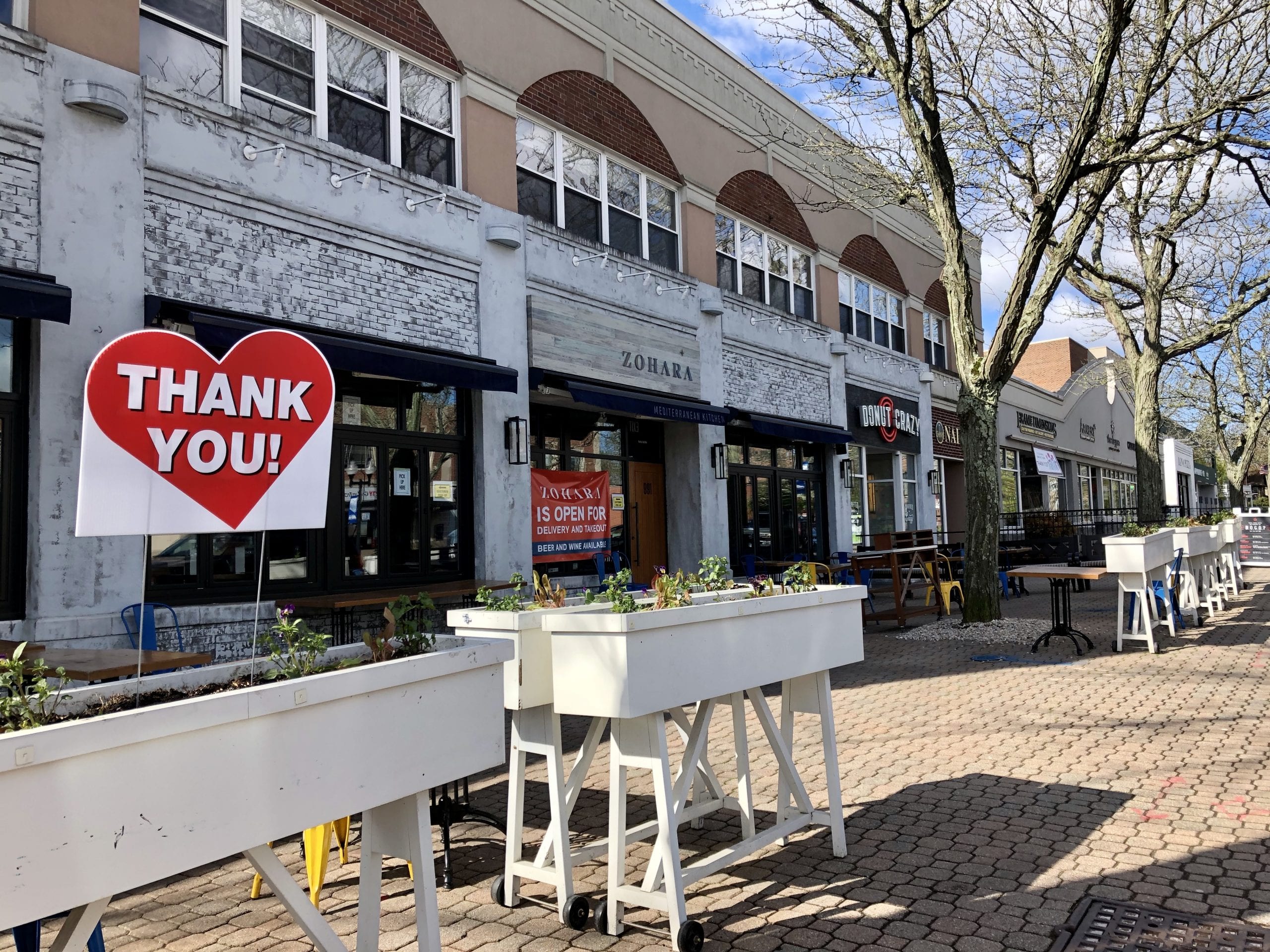
West Hartford restaurants will be able to open for outdoor dining on May 20, as long as they comply with restrictions released by the state early Saturday. Photo credit: Ronni Newton
The rules for reopening Connecticut were released early Saturday, but state officials warned not to expect a rapid recovery.
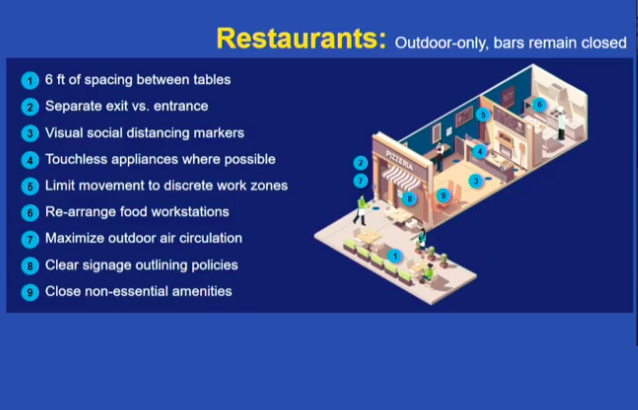
By Mark Pazniokas and Gregory B. Hladky, CTMirror.org
West Hartford-specific information provided by Ronni Newton, We-Ha.com
Retailers, hair cutters, offices and other businesses shuttered in March due to the COVID-19 pandemic are now receiving detailed guidance on changes they must make before reopening on May 20, the first steps towards what state officials warned Friday would be a slow economic recovery.
Gov. Ned Lamont and his advisers outlined Friday some of the granular details about what the new normal will look like in Connecticut hair salons and stores on the same day that the U.S. Department of Labor reported the loss of more than 20 million jobs in April, pushing the U.S. jobless rate to nearly 15 percent.
David Lehman, the state’s commissioner of economic and community development, said he had no immediate estimate on what the May 20 openings might do to improve employment in Connecticut, where more than 400,000 jobs were lost in the instant recession caused by COVID-19 closure orders.
“My expectation is that it’s going to happen very slowly,” Lehman said.
Lamont said consumer behavior is influenced, not controlled, by state policy. He noted that many businesses closed before he issued his orders.
“That’s because consumers didn’t feel confident, and stores didn’t feel confident,” he said.
Based on the experience of southern states that have lifted restrictions, not everyone who can reopen will do so immediately, Lehman said.
The commissioner said more than 45 pages of written guidance would be published Friday night or over the weekend, giving employers their first look at how their businesses and operations would be changing. The guidelines were produced in consultation with industry groups, organized labor and representatives of OSHA, the federal Occupational Safety and Health Administration.
Lehman said that May 20 would not look unlike May 19: Cloth masks still will be required in public and in all work spaces, except private offices; and workers who are 65 or older or have medical risk factors should plan on staying at home for the foreseeable future.
Workers at risk of COVID-19 complications should still be eligible for jobless benefits, even if they are called back to work and decline, Lamont said. But the governor was unsure if there was written guidance on who could refuse to return to work.
“If there are not now, there will be,” Lamont said.
Failure to accept “suitable work” generally results in the loss of unemployment benefits, but state regulations say the “degree of risk to the individual’s health” shall be a factor in determining the whether a job is suitable.
Nail salons will remain closed beyond May 20, a reflection of divisions in the industry about the safety of resuming a business that requires the worker and customer to face each other within arms’ length. Opening immediately would have required the installation of Plexiglas partitions through which customers would extend their hands.
Customers of barber shops and hair salons will be served by appointment only to prevent crowds from congregating. Conversations should be limited on the theory that speaking in close quarters also is a risk of spreading the virus, even when wearing masks.
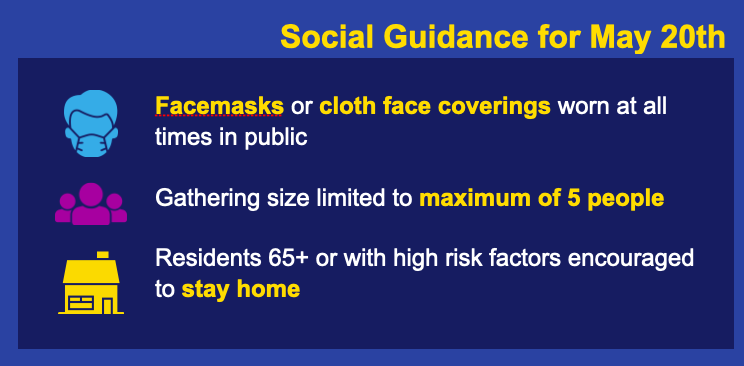
No blow dryers, but color
And the use of blow dryers will be banned, a crimp on styling.
Lt. Gov. Susan Bysiewicz, who has been one of the administration’s liaisons to small businesses, wryly observed the plus side: “Hey, you can color, and there’s a lot of us that would really like that part.”
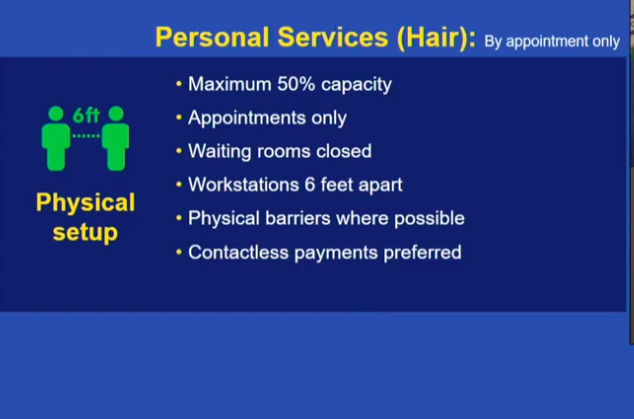
The rules for retailers will be familiar to anyone who has been food shopping since Lamont ordered the closure of non-essential businesses: cloth masks must be worn to enter a store, social distancing rules must be followed, and methods of payment must be non-contact. Expect to see more Plexiglas partitions at check outs.
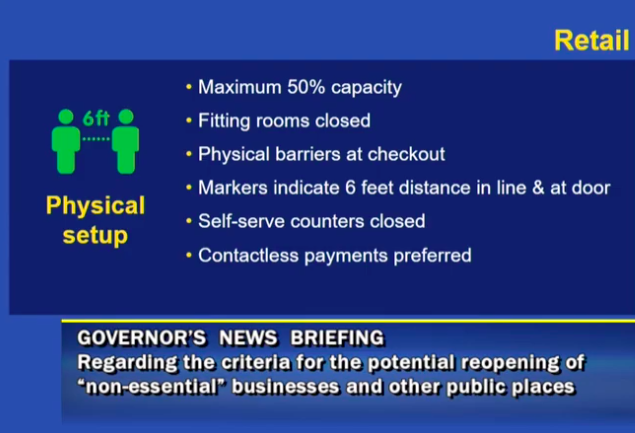
Lamont is signing an executive order permitting restaurants with liquor licenses to serve alcohol at outdoor seating, though local approval still would be required. The executive order would allow an expedited process for local approval.
The governor previously said only outdoor seating would be initially allowed. Lehman said restaurants were being treated differently than stores for two reasons: One cannot eat wearing a mask, and diners linger in restaurants, increasing the time of exposure to others.
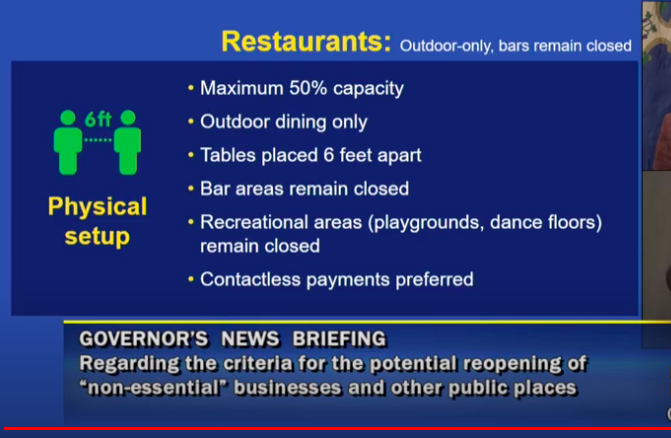
Companies will be expected to have no more than 50 percent of the workforce back in the office, a nudge to businesses to consider telework a permanent feature of office life. The bane of many an American worker – the endless meeting – also will be discouraged. Under the new rules of the road, no in-person meeting can have more than five participants.
Hospitalizations dropping, but coronavirus deaths still rising.
According to the governor’s mid-afternoon report Saturday, hospitalizations due to COVID-19 had declined by 35 during the 24-hour period ending 8:30 p.m. on Friday, to 1,301.
This marks the 16th time in 17 days that hospitalizations from the virus have declined in Connecticut. The outlier was reported on May 5, when hospitalizations increased by 36.
Information released by the state’s Friday indicated another 77 fatalities, and 58 more reported Saturday for a total of 2,932.
Some computer models are predicting there may be more than 4,000 COVID-19 deaths in this state by mid-June.
An additional 627 people tested positive according to Friday’s report, and there were 573 positive tests reported Saturday, bringing the total number of people known to have contracted the virus in Connecticut to 32,984.
West Hartford’s reported cases increased to 366 according to data released Saturday by the state. There were four more cases in data released Friday and nine more on Saturday. Over the past two days there have been three more fatalities reported among West Hartford residents for a total of 69 deaths.
Another 4,367 coronavirus tests were conducted as of Friday’s report and 3,028 tests were reported Saturday, with the total number tested in this state now at 123,569. But Lamont and other state and hospital officials say Connecticut needs to dramatically increase the number of tests to monitor the virus and prevent its resurgence.
Foodshare hands out record 50,240 pounds of free food in one day
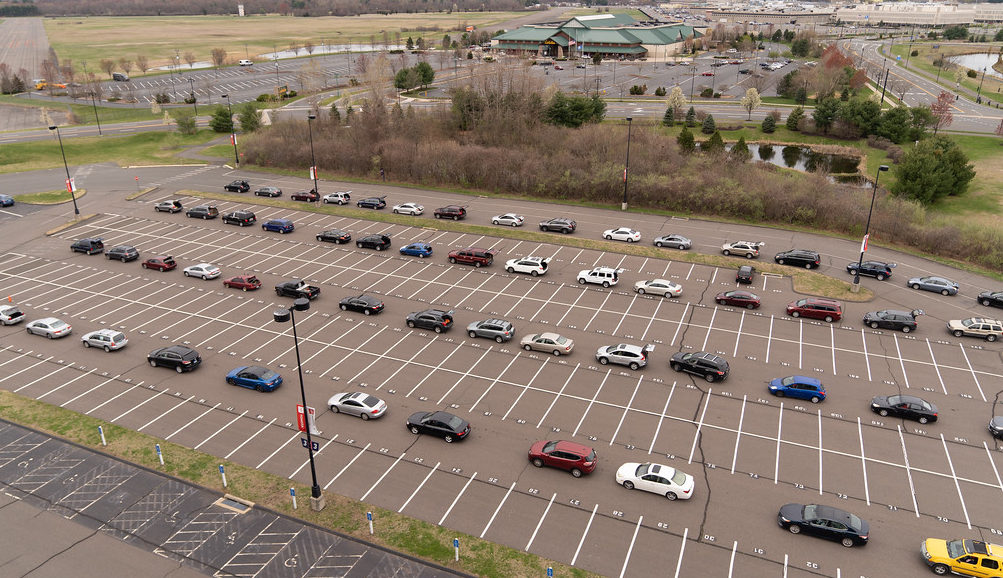
Cars begin lining up around 6am for Foodshare’s expanded food giveaway Rentschler Field in East Hartford. The food giveaway begins at 8:30 a.m. each weekday and runs until noon. Photo credit: Andrew Janavey, Foodshare (Courtesy of CTMirror.org)
Connecticut’s growing problems with hunger as a result of the coronavirus pandemic were glaringly apparent in the seemingly endless line of cars at Rentschler Field in East Hartford Friday to get free groceries from Foodshare.
“Today we had the most cars we’ve ever had,” said Jason Jakubowski, Foodshare’s president and CEO. “We counted 2,512 cars.”
The distribution of 50,240 pounds of free food was also a new one-day record for Foodshare, which serves Hartford and Tolland Counties. People came Friday from as far away as Simsbury, Bristol and Enfield to pick up food, according to Foodshare volunteers, and waited for as long as 45 minutes in the line of cars to collect their food bundles.
“We don’t turn anybody away,” Jakubowski said. “We figure that if you’ve waited in line that long, you’re hungry.”
As Connecticut’s economy continues to falter and unemployment numbers rise, Jakubowski said his organization and other food banks around the state are bracing for a long period when people will need food assistance. State officials say more than 477,000 workers in Connecticut have filed for unemployment since the coronavirus pandemic hit.
Foodshare announced Friday that the Monday-Friday food distribution program at Rentschler Field will continue at least through the end of May and Jakubowski said it could very well last longer. The program operates from 8:30 a.m. until noon weekdays at the East Hartford location.
“The numbers are not receding,” he said. “If these numbers continue, I imagine it will go beyond the end of May.”
“We expect this need to extend well beyond the virus itself,” he added.
During a conversation with U.S. Sen. Chris Murphy on Friday, Jakubowski said his organization is spending $100,000 a week on supplies for pantries and distribution sites across the state, as demand far outstrips donations. In normal times, food banks typically get 75% of their food donated by the grocery industry, but Jakubowski says that source has fallen off as grocery chains attempt to keep up with increased consumer demand.
“Every food bank in America – we’re purchasing food. And food banks are not built to purchase food. We have to go out there – we’re basically competing against each other in order to be able to purchase food.”
Meat shortages hitting Connecticut
Friday’s Foodshare distribution of groceries was also an indication of another growing problem relating to the pandemic: no meat was in the packages handed out at Rentschler.
Jakubowski said Foodshare is now sorting through some meat donations in its warehouse but that his organization has been warned by food industry officials not to expect much more in the near future.
“They’ve made it very clear that meat is going to be scarces over the next several weeks,” Jakubowski said. He added that meat and dairy products are “our two most sought-after products” by people contacting Foodshare for help.
Meat processing plants around the U.S. have been hit hard by COVID-19 outbreaks and many were closed. Several major plants have begun reopening as a result of President Trump’s emergency orders.
Wayne Pesce, head of the Connecticut Food Association, warned Friday that “Connecticut consumers will experience [meat] supply disruptions for the foreseeable future.”
“There are well over 3,700 red meat processing plants and nearly 3,000 poultry processing plants [in the U.S.] and dozens have experienced temporary closures or reduced production,” said Pesce, whose organization represents more than 300 groceries and supermarkets around Connecticut.
“These instances are sporadic and could affect Connecticut retailers, depending on which store or chain is being supplied by one of these impacted companies,” Pesce said in a statement.
Pesce said meat sales around the state are up more than 30-40 percent in recent weeks, “so the demand for product also makes it difficult to keep the stores stocked as they were at pre-pandemic levels.”
But Pesce also said the stores have other types of protein products that continue to be readily available. “If you don’t see the exact cut of pork, chicken or beef you want for your family, you will likely be able to readily identify an alternative protein option,” Pesce said.
Lawmakers travel to nursing homes to thank front-line workers
Caravans of Democratic legislators made stops at more than a dozen nursing homes across the state Friday to thank front-line workers whom they say work in some of the most dangerous conditions created by the COVID-19 pandemic.
Coming east from Danbury, north from Stamford and west from Windham, the legislators converged in Windsor at Kimberly Hall North, a 150-bed facility where the deaths of 40 residents are blamed on COVID-19, and numerous staffers have fallen ill.
“We appreciate you. We love you. You can count on us,” said Sen. Marilyn Moore of Bridgeport, one of the organizers of the caravans. “We’re going to be fighting for you every single day to make sure you have what you need.”
Statewide, about 2,800 have died after testing positive for COVID-19 or showing symptoms of the disease. Nearly 60% were nursing home patients. The state has produced no tally of how many health care workers have been infected by the novel coronavirus.
“We know that you have some of the highest rates of fatalities, and we know how stressful that is for all of you,” Sen. Julie Kushner of Danbury told workers and administrators outside Kimberly Hall. “We haven’t fixed the problems that we have yet. We have to keep working.”
Workers in many homes have complained their employers were slow to provide personal protection equipment (PPE) and that testing was too slow.
With testing capacity increasing each week, the administration of Gov. Ned Lamont said Thursday that it would accelerate efforts to test all residents and staff in each of Connecticut’s 213 nursing homes.
Courtney Wood, the administrator of Kimberly Hall North, said her staff was adequately equipped with PPE through the efforts of its owner, Genesis HealthCare, the state Department of Public Health and the union that represents many employees, SEIU Healthcare 1199NE.
Sen. Mary Daugherty Abrams of Meriden said that was not universal, and she feared that the gradual reopening of businesses in Connecticut will create more demand for protective masks, gloves and gowns.
“I think we really have to consider that,” Abrams said.
Reprinted with permission of The Connecticut Mirror. The author can be reached at [email protected].
Like what you see here? Click here to subscribe to We-Ha’s newsletter so you’ll always be in the know about what’s happening in West Hartford! Click the blue button below to become a supporter of We-Ha.com and our efforts to continue producing quality journalism.




[…] as of May 20 – since outdoor dining is the only on-premise dining that will be permitted. For more information about the state’s guidance that was issued over the weekend, click here. Look for an update this week. Gorski said she has also been working closely with businesses to […]